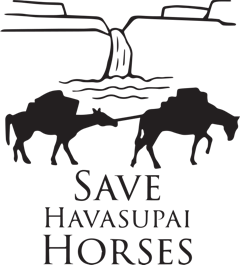PACE: A HAVASUPAI RESCUE
Rescued Havasupai Horse Finds a Forever Home
By Anne Ward Ernst editor@weeklycalistogan.com; Sept. 20, 2016
When he first was seen by two sisters the 20-something-year-old Quarter horse was emaciated, his ribs so pronounced it seemed as if they were barely holding his hide, and open wounds on his back gushed blood. Now in his forever home with Sunrise Horse Rescue, scars mark the areas where the worst wounds were, and he’s continuing to heal and put on weight.
“It’s very surreal to have him here,” said Michelle Grinnell. He’s getting “wonderful attention and care … and I get to see him.”
Grinnell, who lives in Napa, and her sister Katie Migliavacca of San Francisco are largely responsible for rescuing the horse from the abusive and cruel circumstances in which they found him.
They were on a trip to Havasupai Falls in the Grand Canyon in April when they encountered the horse that is now at Sunrise, and several other horses that were being used to transport tourists’ gear – including items such as heavy ice chests, backpacks and camping equipment — on the eight- to 10-mile trek in the Grand Canyon. The sisters, who were carrying their own backpacks and not using a pack horse, were “startled,” Migliavacca said, when they saw the physical condition of the animals. They were even more disturbed to later see the animals beaten and whipped.
They saw Pace tied up for two days with no food or water.
“He wasn’t even given the basics,” Grinnell said.
Pace in the Havasupai village, before being rescued.
They couldn’t shake the image, or the knowledge that these horses – and mules, which are also used as pack animals — were being abused. A couple of days after they returned from their Arizona trip the sisters got to work trying to rescue the horses and mules, and draw attention to what they have now learned is an alleged decades-old problem.
Grinnell and Migliavacca got busy using social media to report what they’d seen and reached out to any animal advocate group or governing agency they could think of that might be able to intervene, and were finally successful in getting the Bureau of Indian Affairs involved. Two agents walked Pace out of the canyon on June 6, they said.
It was then that he got his name.
One of the agents told them that the horse “had one pace, and it was very, very slow,” Grinnell said. And the name stuck.
Pace was taken to Coconino Humane Society in Flagstaff, Arizona, where he was nursed back to a healthy enough status so he could be transported to Sunrise, where the sisters are volunteers, and where the rescue group agreed to take in and keep Pace.
He arrived at Sunrise, which is located on Tubbs Lane where Sundance Ranch and Tamber Bey Vineyards are located, on Saturday, Sept. 3.
Lisa O’Connor, founding member of Sunrise, said Pace is adjusting well to his new surroundings, which include a large shaded area, fresh water and food, and on one particular day lots of sliced apples, something Pace was unfamiliar with.
Pace with his guardians, Kaite Migliavacca and Michelle Grinnell
Photo courtesy of weeklycalistogan.com
When he was first rescued and staying at Coconino Humane Society, Grinnell said Pace didn’t know what to do with treats.
“We gave him an apple and he spit it out,” she said.
Pace is happy to take apple slices from everyone at Sunrise now, and “considering what he has been through, he is doing very well,” said Jeff Hoelsken, executive director of Sunrise.
“The vet noted that he needs some dental work, and we will continue to monitor his weight and nutrition, which is very important after a horse has been through such extreme starvation. His sores have been healing nicely but we are continuing to treat with some ointments and a medicated shampoo. In general, he is in good health and he continues to improve, which is a credit to the people and organizations that first rescued him and began his re-feeding and wound care protocols,” Hoelsken said.
“It’s amazing to me he can learn to trust,” Grinnell said.
Pace enjoying his new life at Sunrise Horse Rescue
As great as it is that Pace is in a safe place where he will be cared for the rest of his natural life, Grinnell, Migliavacca, O’Connor, Hoelsken, and others in the Sunrise Horse Rescue group said this is just one horse, just the tip of the iceberg. There are many others that are in need of rescuing, but the issue is layers deep involving a Native American sovereign nation, government bureaucracy, and tourists who are booking trips to the falls through third-party operators unknowingly supporting wranglers who own, and abuse or neglect, the horses, mules and donkeys that carry their gear up and down the canyon trails.
Watch a recent video of Pace feeling good and having fun at Sunrise Horse Rescue.




